Joint pain can significantly impact daily life and overall well-being. While various treatments and therapies exist for managing joint pain, the role of rest and relaxation should not be underestimated. Rest and relaxation play a crucial role in joint pain management, helping to reduce inflammation, relieve stress on the joints, and promote overall joint health. In this article, we will explore the importance of rest and relaxation in joint pain management and provide insights into how you can nurture your joints for optimal comfort.
- Reducing Inflammation:
Rest is essential for reducing inflammation in the joints. When joints are overworked or subjected to repetitive movements, inflammation can occur, leading to pain and discomfort. Allowing your joints to rest and recover helps reduce inflammation and provides an opportunity for the body to repair damaged tissues. It is important to strike a balance between activity and rest to prevent exacerbating joint pain.
- Easing Joint Stress:
Rest and relaxation help alleviate stress on the joints. Taking breaks from weight-bearing activities and giving your joints time to recover can help reduce the strain on the affected areas. This is particularly important for individuals with conditions such as osteoarthritis or rheumatoid arthritis. Giving your joints adequate rest allows for better joint function and minimizes the risk of further damage.
- Promoting Muscle Relaxation:
Relaxation techniques such as meditation, deep breathing exercises, or gentle stretching can help promote muscle relaxation and reduce muscle tension around the joints. Tight muscles can contribute to joint pain and discomfort. Incorporating relaxation techniques into your daily routine can help alleviate muscle tightness, reduce joint stiffness, and enhance overall joint mobility.
- Managing Stress and Emotional Well-being:
Chronic joint pain can have a significant impact on emotional well-being, leading to stress, anxiety, and even depression. Rest and relaxation techniques provide an opportunity to manage stress levels and support emotional well-being. Activities such as reading, listening to music, practicing mindfulness, or engaging in hobbies can help distract from pain and promote a sense of calm and relaxation. Managing stress is crucial for overall joint pain management.
- Enhancing Sleep Quality:
Rest and relaxation contribute to improved sleep quality, which is essential for joint pain management. Chronic joint pain can interfere with sleep, leading to sleep disturbances and fatigue. Creating a conducive sleep environment, practicing good sleep hygiene, and incorporating relaxation techniques before bedtime can help promote better sleep quality. Quality sleep allows the body to repair and rejuvenate, supporting joint health and reducing pain intensity.
- Allowing for Tissue Repair:
Rest is a crucial component of the body’s natural healing process. When joints are given adequate rest, damaged tissues have the opportunity to repair and regenerate. This is particularly important after injury or intense physical activity. Allowing your joints sufficient time to rest and recover after exertion helps prevent further damage and supports the healing process.
- Balancing Activity and Rest:
Finding the right balance between activity and rest is key to managing joint pain effectively. While rest is important, it is equally important to engage in gentle, low-impact activities to maintain joint mobility and strength. Finding the right balance may require adjustments and listening to your body’s cues. Consulting with a healthcare professional or physical therapist can help you develop a customized plan that incorporates appropriate activity and rest periods.
In conclusion, rest and relaxation play a crucial role in joint pain management. By incorporating adequate rest, relaxation techniques, and finding a balance between activity and rest, you can nurture your joints, reduce inflammation, relieve stress on the joints, and promote overall joint health. Remember to consult with a healthcare professional for personalized guidance and recommendations based on your specific condition and needs.












